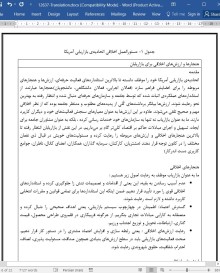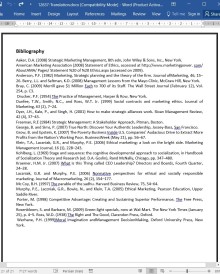
دانلود مقاله بازاریابی اخلاقی و استراتژی بازاریابی
مقدمه
میتوان بازاریابی اخلاقی را به عنوان مجموعه فعالیتهایی قلمداد نمود که در آنها بر سیاستها و فعالیتهای بازاریابی فردی و سازمانی شفاف، قابل اعتماد و مسئولانه تاکید شده و حس درستکاری ، رفتار عادلانه به مصرف کنندگان و سایر ذی نفعان انتقال داده میشود (مورفی و همکاران، 2005).این تعریف منعکس کنندهی بُعد هنجاری اخلاق بازاریابی است. در واقع در تعریف ارائه شده دیدگاه ترویج دهنده / ترغیب کنندهای راجع به نحوهی نظارت بازاریابان بر فعالیتها، برنامهها، و رویههای آنها در خلال تعامل استراتژیک با بازارهای هدف نهادینه شده است. این رویکرد کاملاً با روحیهی انگیزشی حاکم بر دستورالعملهای حرفهای مورد استفادهی فعالان بازاریابی همچون دستورالعمل اخلاقی اتحادیهی بازاریابی آمریکا (AMA- 2008) سازگاری دارد. در این استاندارد از افراد خواسته شده تا خود را با بالاترین استانداردهای حاکم بر قواعد و ارزشهای حرفهای و مسئولیتهای محول شده به آنها در قبال ذی نفعان مختلف هماهنگ کنند.
در این دستورالعمل همانند سایر دستورالعملهای ایده آل، در سطح جزئیات و تفسیر مفاهیم پیچیدهای همچون شفافیت، درستکاری، ایجاد اعتماد، و ماهیت عملکرد منصفانه در شرایط مبادلاتی بخصوص با مشکل و تناقض روبرو میشویم. بنابراین در سلسله نکات مطرح شده در ادامهی بحث تلاش خواهیم نمود تا اصول مفهومی استراتژی بازاریابی اخلاقی را از دیدی کاربردی و شفاف شرح دهیم. این هدف به سه طریق به واقعیت بدل میشود. در ابتدا بازاریابی اخلاقی هنجاری را به 7 گزاره/ اصل پایه تقسیم میکنیم (لازنیک و مورفی، 2006). سپس این گزارهها را به رویکردهای کاربردی شرکت تحت عنوان بهترین رویهها در بازاریابی اخلاقی مرتبط میسازیم (کلین، لازنیک و مورفی، 2006)، در وهلهی سوم هر دو مرحلهی قبلی در چهارچوب دستورالعملهای اخلاقی اتحادیهی بازاریابی آمریکا (2008) مورد بازنگری قرار گرفته تا تعارض و تضاد پیش روی بازاریابان حرفهای از منظر قواعد و ارزشهای مربوطه را بخوبی درک کنیم.
نتیجه گیری
با تحلیل اصول اخلاقی پایهای 7 گانه ، دستاوردهای متعددی برای مدیران بازاریابی حاصل میشود. اول اینکه مفهوم بازاریابی، فرمول بندی استراتژی، بازاریابی روابط، مدیریت زنجیره تأمین همگی ذاتاً فعالیتهای اخلاقی محسوب میشوند. در صورتی که هر فعالیت بازاریابی در صدد موفقیت باشد، باید اعتماد و رفتار عادلانه بین بازاریابان، مشتریان، تأمین کنندگان و کاربران نهایی حفظ شود. این موضوع بخوبی در اصول پایهای گنجانده شده است. واضح است که ابعاد اخلاقی بازاریابی موضوعات جدیدی نبوده بلکه همان مفاهیم نظری از جنبهی جدیدی بررسی میشوند.
دوم اینکه مسائل اخلاقی پیش روی بازاریابان در آینده به تحلیلهای فنی و هنجاری نیاز دارند. اکثر مسائل اخلاقی پیچیده هستند. یک واکنش شرکتها استخدام مشاوران اخلاقی یا بازرسان اخلاقی درونی است تا سؤالات، مسائل مطرح شده در آموزشهای اخلاقی را منعکس کنند. اما این موضوع دیگر به اندازهی قبل مورد نیاز نیست. برای مثال بسیاری از مسائل آلودگی زبالهای و زیست محیطی مستلزم برخورداری از جنبههای فنی بازیافت یا دفع زبالهها هستند. تصمیم صحیح قابل تعیین نیست، مگر اینکه مبانی علمی در وهلهی نخست تعیین شوند. بنابراین هر دو نوع تحلیل برای تشریح تصمیمها و انتخابهای سخت پیش روی بازاریابان مفید واقع میشوند.
سوم اینکه میتوان نقش بازاریابی در جامعه و مواجهه با مسائل اجتماعی را از نقطه نظر اخلاقی مورد بررسی قرار داد. بازاریابی به عنوان یک روند اجرایی دستاوردهای زیادی را برای جامعه در گذر زمان در پی داشته است و معمولاً از نقطه نظر اخلاقی مورد رسیدگی قرار میگیرد. اما بازاریابی عامل برتری عظیمی تلقی میشود. عوامل بازاریابی به وفور برای حل مشکلات اجتماعی جهانی همچون آموزش ایدز، پیشگیری از استفادهی غیرقانونی از مواد مخدر، رسمیت دادن به آموزشهای نوآوری و سایر مداخلههای اجتماعی مستلزم تبلیغ و ترویج کاربرد دارند. بازاریابی پتانسیل زیادی برای بحث راجع به مشکلات اجتماعی و برطرف سازی آنها دارد. استراتژیهای مبتنی بر بازاریابی تأثیر مثبتی را روی بهبود شرایط محیطی بجا گذاشته و نیازهای مصرف کنندگان محروم را در آیندهی نزدیک بهبود خواهند داد.
چهارم اینکه شرکتهای مبتنی بر بازاریابی اخلاقی جهت گیری و مشارکت بهینه نسبت به ذی نفعان را در پیش میگیرند. شرکتهای برتر که نمونههایی از آنها معرفی شدهاند حقوق ، ادعاها و فرضیات گروههای متأثر از فعالیتهای شرکت تجاری را مدنظر قرار میدهند. آنها به مراتب فرای ملزومات قانونی عمل میکنند. در اصول 2 و 6 علناً به این موضوعات پرداختهایم. هرچند بسیاری از شرکتها ذی نفعان را عواملی مهم در وبسایت خود معرفی میکنند ، اما برترین شرکتها یک گام دیگر رو به جلو گذاشته و تعامل دائمی با ذی نفعان راجع به تغییر شرایط را به صورت دائمی پیگیری میکنند.
INTRODUCTION
Ethical marketing can be defined as practices that emphasize ‘‘transparent, trustworthy, and responsible personal and/or organizational marketing policies and actions that exhibit integrity as well as fairness to consumers and other stakeholders’’ (Murphy et al., 2005). This definition reflects the normative dimension of marketing ethics; that is, it embodies an aspirational view of how marketers ought to oversee their actions, programs, and procedures as they strategically engage their target markets. The approach is consistent with the motivational spirit of professional codes for marketing practitioners such as the American Marketing Association (AMA) Statement of Ethics (2008), which asks members to commit themselves to embracing ‘‘the highest standards of professional norms and values implied by our responsibilities to multiple stakeholders ...’’
Of course, like with most statements of ideals, the difficulty and debate occurs in the details and interpretation of complex concepts such as transparency, integrity, creating trust, and determining the meaning of fairness in particular exchange situations. In the points that follow, we try to make more pragmatic and tangible the conceptual dimensions that underscore the essentials of ethical marketing strategy. This is done in three ways. First, we distill the notion of normative ethical marketing into seven basic propositions (BPs) (Laczniak and Murphy, 2006) (referenced as LM, hereafter). Then, we link these propositions to actual company approaches that have been acclaimed as ‘‘best practices’’ in marketing ethics (Klein, Laczniak, and Murphy, 2006). Third, both of these perspectives will also be connected to the AMA Statement of Ethics (2008) in order to underscore the contention that there exist distinct norms and values to which professional marketers are expected to conform.
Some further words about this blended approach to clarifying the nature of ethical marketing are in order. In LM, the authors set about reviewing various frameworks in moral philosophy and models of corporate social responsibility (CSR) in order to derive the BPs that comprise ethical marketing. This is analogous to the promulgation of principles essential to informed marketing management such as ‘‘understand consumer needs,’’ ‘‘segment markets according to meaningful criteria,’’ and ‘‘measure customer satisfaction.’’ Like most sets of marketing principles, the normative moral perspectives discussed in this article are ‘‘integrative’’ in that each informs and supplements the others.
CONCLUSION
Several conclusions can be drawn for marketing managers from the analysis of the seven BPs above. First, the marketing concept, strategy formulation, relationship marketing, and supply chain management are all inherently ethical activities. If any or all of these marketing practices are to be successful, a sense of trust and fairness must exist among marketers, their customers, suppliers, and end users of their products. This notion is implicit in the BPs. Clearly, the ethical dimensions of marketing are not new ideas but rather theory-inspired approaches that require renewed diligence.
Second, ethical issues facing marketers in the future will likely require both a normative and technical analysis. Most ethical problems are complex. One reaction by companies has been to hire ethics consultants or internal ethics officers to help them deal with these questions and set up ethics training programs. However, this is probably not enough any longer. For example, many environmental and solid-waste problems necessitate sophisticated technical advice on (for example) recycling versus landfill disposal. The ‘‘right’’ decision may not be clear until the scientific evidence is first factored in. Thus, both types of analyses should help illuminate the difficult choices ahead for marketing executives.
Third, marketing’s role in society and in dealing with social issues should be examined from an ethical standpoint. Marketing as a business practice has made major contributions to society over time and occasionally is judged harshly from an ethical performance viewpoint. But marketing can be an exceptional force for ‘‘good.’’ Marketing methods will increasingly be called upon to shape various social issues facing the world such as AIDS education, discouraging illegal drug use, helping publicize innovations in education, as well as various other social interventions that require promotion and dissemination. Marketing has much to offer to the discussion and the potential alleviation of social problems; marketing-rooted strategy can contribute positively to environmental betterment and to meeting the needs of disadvantaged consumers in the future.
مقدمه
در بازاریابی اخلاقی افراد در اولویت نخست قرار میگیرند
مسئولیت اخلاقی فرای ملزومات قانونی قرار میگیرد
در بازاریابی اخلاقی به نیت، ابزارها و اهداف توجه میشود
بازاریابان اخلاق مدار سعی کرده تصور اخلاقی را گسترش دهند
بازاریابان اخلاقی ارزشهای هستهای را رعایت میکنند
بازاریابان اخلاقی مفهوم ذی نفع را میپذیرند
بازاریابی اخلاقی باید فرایند استدلال اخلاقی را دنبال کند
نتیجه گیری
منابع
INTRODUCTION
ETHICAL MARKETING PUTS PEOPLE FIRST
ETHICAL RESPONSIBILITY EXCEEDS LEGAL REQUIREMENTS
ETHICAL MARKETING CONSIDERS INTENT, MEANS, AND ENDS
ETHICAL MARKETERS TRY TO INSPIRE MORAL IMAGINATION
ETHICAL MARKETERS EMBRACE CORE VALUES
ETHICAL MARKETERS ACCEPT THE STAKEHOLDER CONCEPT
ETHICAL MARKETERS SHOULD EMBRACE A PROCESS OF MORAL REASONING
CONCLUSION
Bibliography
- اصل مقاله انگلیسی با فرمت ورد (word) با قابلیت ویرایش
- ترجمه فارسی مقاله با فرمت ورد (word) با قابلیت ویرایش، بدون آرم سایت ای ترجمه
- ترجمه فارسی مقاله با فرمت pdf، بدون آرم سایت ای ترجمه



